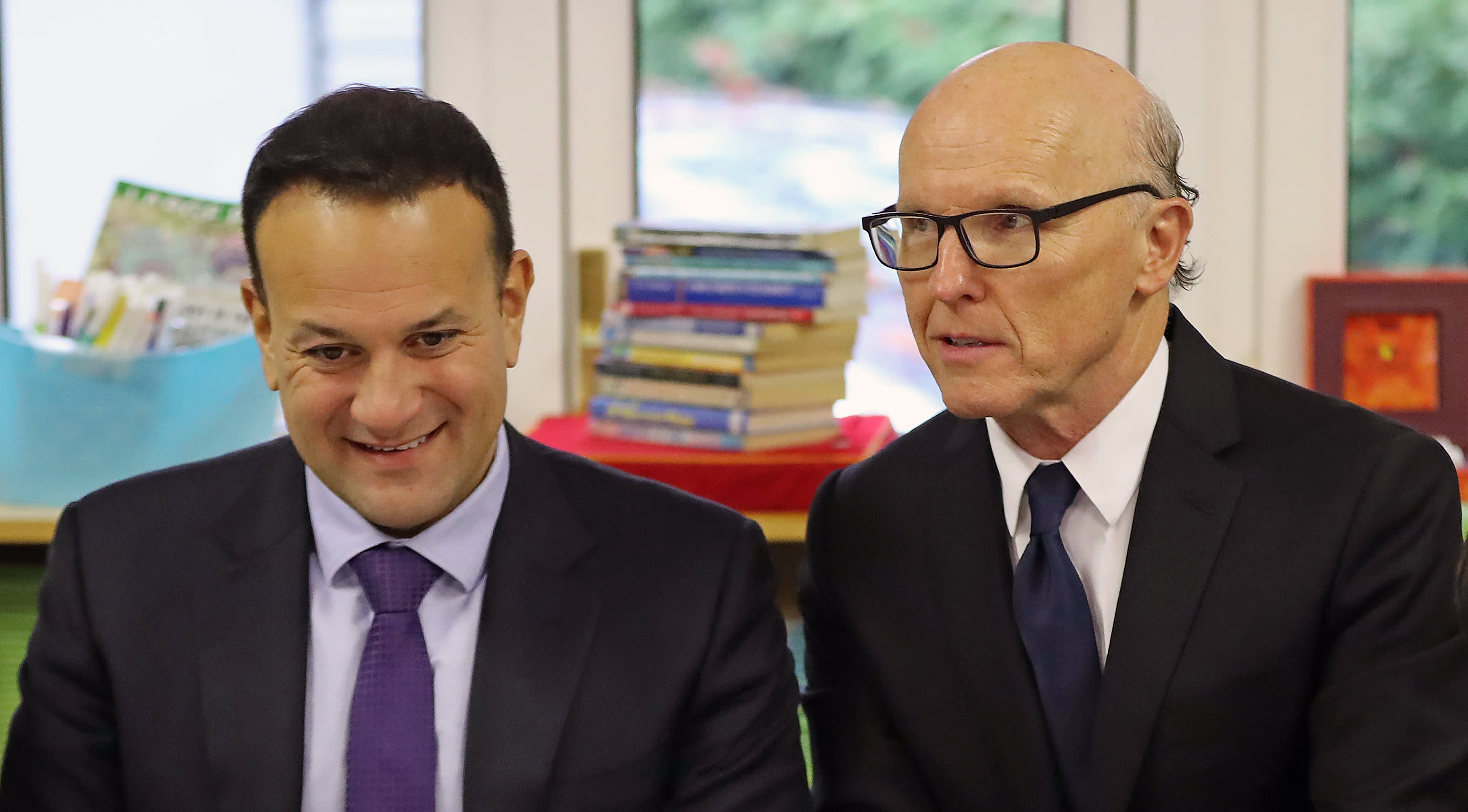
Taoiseach Leo Varadkar and US business man David McCourt who leads The Irish Broadband consortium sign the National Broadband plan.
Niall Carson/PA Images via Getty Images
DUBLIN — Ireland’s 3 billion euro ($3.5 billion) plan to connect rural areas to high-speed broadband is on track to be delivered in under 10 years, according to the firm leading the rollout.
David McCourt is the chairman of National Broadband Ireland (NBI), the vehicle created by U.S. media and telecoms investment firm Granahan McCourt, which won the National Broadband Plan contract.
He told CNBC that despite some hurdles in the early days of the coronavirus lockdown, the project could be completed in around seven years, under the originally slated 10 years.
The 25-year contract, which will see NBI manage the network after completion, was signed in November 2019. It brings together several firms and contractors to build the infrastructure to connect 540,000 premises (roughly 1.1 million people in a country of nearly 5 million) with high-speed broadband.
First proposed in 2012, the National Broadband Plan has been a protracted and at times controversial process.
Siro, a joint venture between Vodafone and electricity utility ESB, pulled out of the bidding in 2017. Eir, Ireland’s largest telco, exited in early 2018 citing “uncertainty on a range of regulatory and pricing issues.”
In October 2018, Communications Minister Denis Naughten resigned over meetings with McCourt that had not been documented. An independent inquiry found that the meetings did not unduly influence the bidding process.
Ultimately the contract was awarded to National Broadband Ireland with surveying and work commencing in early 2020 — but the coronavirus lockdown disrupted that process.
“Obviously Covid is disrupting the whole world so it would be a lie to tell you it hasn’t been a pain in the neck in more ways than one,” McCourt told CNBC.
Travel restrictions and social distancing made it difficult for surveyors to travel the country and work together.
“For the first 30 days that was disruptive but I think we’ve worked our way through that,” he said.
Other companies and subcontractors involved include network operator Enet, Nokia, and telecom and construction firms Actavo, KN Group and the Kelly Group.
Milking time at Jim O’Rourke’s dairy farm at Cootehill, County Cavan in Ireland. The herd of Holstein Fresian cows produce around 160,000 gallons of milk per year which is processed into powder, butter and ice cream for export.
Market demands
Work has commenced on connecting premises in the Irish counties of Galway, Cork and Cavan, with several schools now on the network.
At the start of the project, NBI stated it would connect premises at a basic speed of 150 Mbps but said in August that that would rise to 500 Mbps.
“We knew the market was going to want and demand and need higher speeds than what we were contractually obligated to deliver,” McCourt said.
“When a contract spec is written, it’s at one point in time and then the contract goes out to a procurement process and years pass by and the world just moves on so we knew that we were going to be way more than the minimum speed that was in the contract.”
There is also the matter of competition. Eir is connecting several rural regions through its own billion-euro investment program.
Despite pulling out of the bidding process, Eir still has links to the National Broadband Plan. It has a regulated obligation to give other providers access to its infrastructure, which NBI is availing of by connecting premises via some of Eir’s poles around the country.
Improvements to rural Ireland’s broadband quality come at a pivotal time for remote working, brought on by the Covid-19 pandemic.
“Covid has basically accelerated the world by a generation. Everything that’s happening, the rural-urban divide, on a retail level and the commercial property side was going to happen eventually anyway,” McCourt said.
Poor connections outside urban areas make that shift very challenging. A survey conducted by Taxback.com found that 51% of over 2,500 respondents in the country were inhibited from working at home since March due to poor broadband quality.
Contract
At the end of the 25-year contract, the Irish state will not own the network. In August, a heavily redacted version of the National Broadband Plan contract was released to the public.
Running over 2,000 pages, the contract gave some insight into just how vast the plan is but details on subsidy payments and the nitty-gritty on operational performance were withheld.
McCourt said that many different voices are at play from either government or the companies involved on what would be released.
“I welcomed it being public. I’m not in charge of the redactions, there’s lots of different people. The regulator had his or her viewpoint, I’m sure the department had their viewpoint, all the different people have their view on what is harmful to them to do their job,” McCourt told CNBC.




